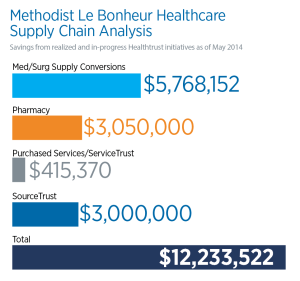Methodist Le Bonheur Healthcare anticipates over $12 million in savings after instituting various HealthTrust programs
Since Methodist Le Bonheur Healthcare joined HealthTrust in 2013, the eight-hospital nonprofit system based in Memphis, Tennessee has netted numerous benefits. Savings, both realized and in progress, total more than $12 million, and departments across the system are benefiting from greater efficiencies, thanks to a number of HealthTrust programs being put into place.
However, the benefits of HealthTrust membership don’t stop at savings or increased productivity. Due to its high level of compliance and commitment to the HealthTrust model, Methodist Le Bonheur Healthcare has experienced not just a change in GPO, but also a change in culture.
Preparing for the Future
Before joining HealthTrust, Methodist Le Bonheur Healthcare was already making a lot of savvy financial choices. Its supply chain was centralized, it was a compliant member of another GPO and its overall financial performance was strong.
But with the looming changes in healthcare that were threatening providers everywhere, senior leadership knew they needed to do more to continue providing the same level of excellent patient experience and clinical quality.
“It was imperative that our cost structure change,” says Gary Shorb, CEO of Methodist Le Bonheur Healthcare.
Larry Fogarty, vice president of supply chain management and CFO of Methodist Olive Branch Hospital in Olive Branch, Mississippi, also saw other requirements. “We needed to think differently,” he says. “We realized early on that the old way of doing things wouldn’t work, and becoming more standardized and more compliant were things we believed were critical to our success going forward.”
Already familiar with HealthTrust’s core GPO offerings, Shorb along with President and COO Michael Ugwueke attended a presentation highlighting some early results of Catholic Health Partners’ membership in HealthTrust.
“We were very impressed by what we saw,” Shorb says. “It was clear that HealthTrust was an organization that could show tremendous value through member commitment and compliance.”
After learning more about the breadth of HealthTrust’s offerings, Shorb, Ugwueke, and Executive Vice President and CFO Chris McLean made a presentation of their own to key stakeholders at Methodist
Le Bonheur Healthcare
“The value was very obvious, and there was no need to start hard-selling to convince people it was a good idea,” Ugwueke says. “Everybody saw something they liked and knew that their particular area would benefit from a partnership with HealthTrust.”
Shorb admits that he was initially skeptical of the potential savings HealthTrust presented, but after talking to a few suppliers, they assured him that some of their best pricing was with HealthTrust.
“We realized early on that the old way of doing things wouldn’t work, and becoming more standardized and more compliant were things we believed were critical to our success going forward.”
—Larry Fogarty, vice president of supply chain management and CFO of Methodist Olive Branch Hospital
“It was a pretty easy decision to make and get behind,” Shorb says. “With the data comparisons we saw, it was proof positive that there was a lot of opportunity. We saw it as a perfect alignment of great knowledge and a proven track record of operational performance that we could benefit from.”
Methodist Le Bonheur Healthcare became a HealthTrust member on March 1, 2013, and from that point on became fully committed to taking advantage of all that HealthTrust had to offer.
Maximizing Its Membership
Fogarty and his team got to work staging the successive steps that would be necessary to make the transition happen. “We broke down the opportunity into fundamental parts,” he says.
The first step was moving medical supplies and surgical instruments the system was presently using over to HealthTrust contracts that were already in place. That included 4,334 unique products from 193 different manufacturers, totaling $47 million in annual spend.
With that completed in the first three months of the relationship, Fogarty and his team moved on to product conversions. Through April 2014, Methodist Le Bonheur Healthcare had converted 1,421 unique products from over 100 different manufacturers, totaling $13 million in annual spend. Overall savings from these med/surg conversions total more than $5.7 million.
Meanwhile, purchased service agreements through ServiceTrust have earned the system more than $400,000 in savings.
On the pharmacy side, HealthTrust contracts have saved the system $3.05 million in implemented savings, thanks to Methodist Le Bonheur Healthcare’s optimization of the GPO agreements, as well as its ability to quickly make market-share requirements for several different clinical contracting integration initiatives (CCII).
In one CCII, Methodist Le Bonheur Healthcare achieved a 100 percent market share, well over the 75 percent requirement. Kara Fortune, PharmD, director of clinical integration and implementation at HealthTrust, explains that moving to one product in an individual therapeutic class doesn’t necessarily result in better pricing, but it can help streamline operations and reduce medication errors.
Fortune’s team also provided clinical support to the pharmacy directors at Methodist Le Bonheur Healthcare, offering the system’s Pharmacy and Therapeutics Committee supporting information as members worked to streamline various drug categories.
Between the med/surg and pharmacy initiatives, Methodist Le Bonheur Healthcare made thousands of contract conversions in a short period of time.
“It was a huge challenge and not one to be underestimated,” Shorb says. “We got through it because we communicated and made sure the staff knew how important these changes were to our future.”
The messages to employees came straight from Shorb and other members of senior leadership, who heeded HealthTrust’s advice that a change as massive and aggressive as the one Methodist Le Bonheur Healthcare wanted to make would require an engaged C-suite.
“Leadership at the system level has encouraged this cultural change,” says Amanda Murphy, account director, HealthTrust. “With clear communication, they paved the way for tremendous effort and teamwork among all departments to successfully implement a common goal.”

But Shorb is quick to point out the C-suite didn’t have to be over-involved. “We certainly stayed on top of it, but we haven’t had to micromanage it, which speaks to the quality of the people, both here and at HealthTrust.”
Fogarty has been equally impressed with the support his team has received from the supplier community and is certain it will continue as Methodist Le Bonheur Healthcare takes advantage of other HealthTrust opportunities.
“We have enthusiastically embraced HealthTrust as a partner,” he says, “and that has been understood by the supplier community. GPO changes are difficult endeavors, and it takes suppliers, HealthTrust, and our leadership, clinicians and physicians all working together.”
With each successive step they take with HealthTrust, leaders at Methodist Le Bonheur Healthcare will refer to the success they’ve already had. “Reminding our clinical leaders of the successful work we’ve already done serves as a catalyst and provides momentum for the effort,” Fogarty says.
Broadening the Relationship
But the hard work is far from done. At press time, Methodist Le Bonheur Healthcare was evaluating a physician preference item (PPI) initiative with SourceTrust in the areas of cardiovascular, spine and osteobiologics. The scope and size of this initiative could bring over $3 million in savings to the organization. This high savings opportunity creates a number of challenges related to implementation.
“It’s going to take a great deal of physician alignment,” Fogarty says. “But we are confident we will find a way to make this kind of relationship work for physicians and us as an organization, because it’s what we need in order to continue to be successful.”
Ugwueke acknowledges that PPI initiatives are tough to execute, but he is confident that the SourceTrust team will provide the support Methodist Le Bonheur Healthcare needs to see it through.
“Every time we’ve called them, they’re willing to come in day or night as we discuss and negotiate with physicians.”
—Michael Ugwueke, president and COO, Methodist Le Bonheur Healthcare
“Already their support has been a real value-add,” he says. “Every time we’ve called them, they’re willing to come in day or night as we discuss and negotiate with physicians. And having access to HealthTrust’s panel of expert physicians who can weigh in when we get a lot of resistance is huge.”
Even with its biggest initiative not yet finalized, Methodist Le Bonheur Healthcare is exploring other ways to take full advantage of its HealthTrust membership. These include benchmarking, clinical and nonclinical staffing opportunities, as well as modeling best practices it has witnessed after meeting with fellow HealthTrust members.
“We’ve seen a real discipline around data and execution that we’re trying to replicate,” Shorb says. “The way they manage data on a real-time basis is definitely industry best practice. And since our cultures are so compatible—focused on patient experience and clinical quality—we’ve seen that you can achieve additional efficiencies without sacrificing that.”
On a recent visit to HCA hospitals in Nashville, Tennessee, Shorb and Ugwueke paid close attention to how the staff handled scheduling, staffing and productivity.
“It was an eye-opener to see how they integrated those three areas not just to take out cost, but also as a way to make the whole system more efficient,” Ugwueke says.
Jay Kirkpatrick, former CEO of the Mid-America Region for HealthTrust, encourages other members to take note of Methodist Le Bonheur Healthcare’s success—and how it can be replicated.
“The leadership team at Methodist Le Bonheur Healthcare clearly recognized the significance of the changes in the healthcare industry,” Kirkpatrick says. “They knew they had to make some real changes to remain viable and serve their local communities. They were willing to make those transitions, and we are proud to be a part of their journey.”
Share Email Purchased Services





